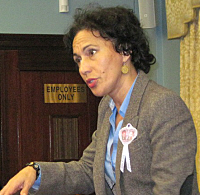
Sen. Nereida Rivera-O’Reilly, the bill’s sponsor, said the bill aimed to give police and the Division of Licensing and Consumer Affairs more teeth to go after those who deal in stolen materials, track what metals are bought and sold, and hopefully discourage acts of theft and vandalism.
She pointed to a recent spate of extreme cases of theft, including a recent spate of stolen manhole covers and a series of cable thefts that shut down phone and internet for some.
"The Women’s Coalition (of St. Croix) shared with us they have had air conditioning units completely stripped for their copper tubing, and when their building burned down, people came in and stripped the wires," O’Reilly said.
The bill [30-0012] requires scrap metal dealers to be licensed and to keep records of their suppliers, in a similar fashion as cash-for-gold businesses currently are mandated to do. It also specifically prohibits the sale of metal infrastructure that would not normally be on the market, such as guardrails, road signs, utility lines, manhole covers and so on.
It gives the police the power to put a hold notice on a scrap metal dealer or recycler if there is a reasonable suspicion that there are stolen materials.
A dealer breaking this law the first time is subject to a misdemeanor conviction and up to four days in jail and a fine of $500. Anyone who commits a third or subsequent violation is guilty of a felony, punishable by up to 18 months in prison and a fine of $5,000 or double the loss suffered by a victim.
The bill would forbid any cash transactions in excess of $100 for for scrap metal.
Assistant Police Commissioner Thomas Hannah and St. Croix Police Chief James Parris both testified in support of the bill.
Scrap metal theft is a growing, worldwide problem, Hannah said.
"From the Bahamas, Antigua, Dominican Republic, across the United States, Canada, England, France and as far as Russia, laws and regulations are being changed to control this growing problem," Hannah said.
"We strongly believe that by working with Licensing and Consumer Affairs’ enforcement division and other agencies, we will be able to put a big dent in the buying and selling of stolen metal items and make it easier for those who are legitimate and want to do things the right way."
Voting to send the bill on for further consideration by the Rules and Judiciary Committee were: Sens. Judi Buckley, Diane Capehart, Clifford Graham, Terrence Nelson and Alicia Hansen. Sens. Craig Barshinger and Donald Cole were absent.
The committee also sent on a bill from Nelson to create a referendum on the 2014 V.I. ballot asking if the U.S. Congress should increase the term of a V.I. Legislator from two years to three years. [30-0159]
Nelson said he hoped a change of that sort would enable legislators to focus more on their work and allow them to spend less time campaigning.
V.I. Elections Supervisor Caroline Fawkes testified that the cost of such a change has to be taken into consideration.
"The Legislature needs to analyze the proposal as to its impact to the election system, because of our looming budgetary constraints," Fawkes said. Adding a referendum to the ballot will make the election a bit more complicated and more expensive, she said.
She also suggested that staggered four-year terms might be a better option, so that there are always experienced senators in office, a position that several senators, including Sens. Clifford Graham and Diane Capehart, endorsed.
Nelson said he had no objection to amending the measure to reflect Fawkes’ suggestions when the bill is considered next in the Rules and Judiciary Committee.
If enacted, the bill will not change the length of terms, but only ask if the public would like Congress to do so. Congress may or may not address the matter.
The question could also be settled locally, if and when the territory enacts a V.I. Constitution. U.S. Public Law 94-584 says the "Legislatures of the Virgin Islands and Guam, respectively, are authorized to call constitutional conventions to draft, within the existing territorial-federal relationship, constitutions for the local self-government of the people of the Virgin Islands and Guam."
While the recent Fifth V.I. Constitutional Convention failed to approve a constitutionally and legally sound document, the Legislature has the power to create a new convention and set it up in any manner it chooses, so long as the resulting document meets several basic conditions, such as a republican form of government and recognition of the U.S. Constitution as the supreme law of the land. Any new constitution would take precedence over a change to the territory’s government enacted by Congress.
The committee also approved a bill from Nelson to loosen the requirement that a V.I. government employee take a leave of absence from work when running for elected office in the territory. The bill [30-0176] would make a leave of absence optional, rather than mandatory.
All measures were approved unanimously, with Barshinger, Buckley, Graham, Hansen and Nelson voting yea. Barshinger and Cole were absent.